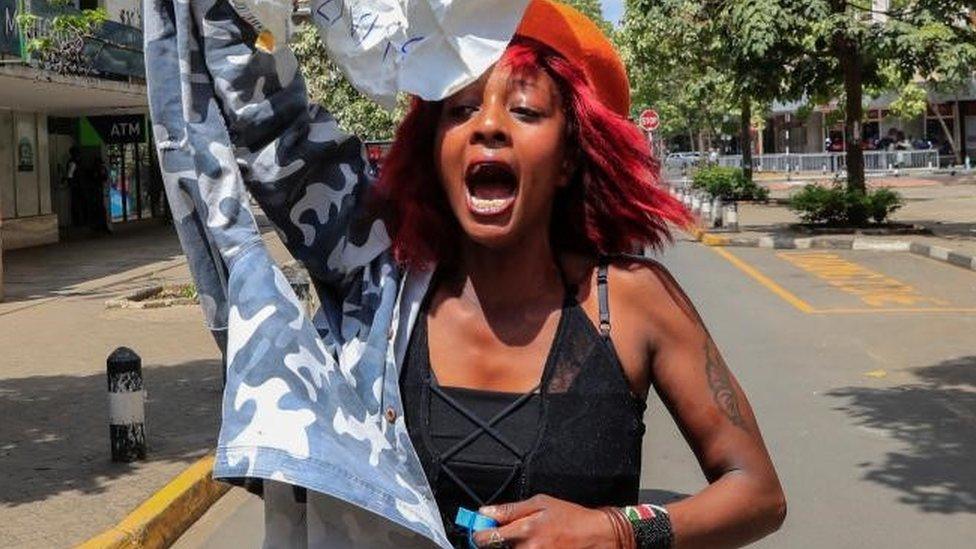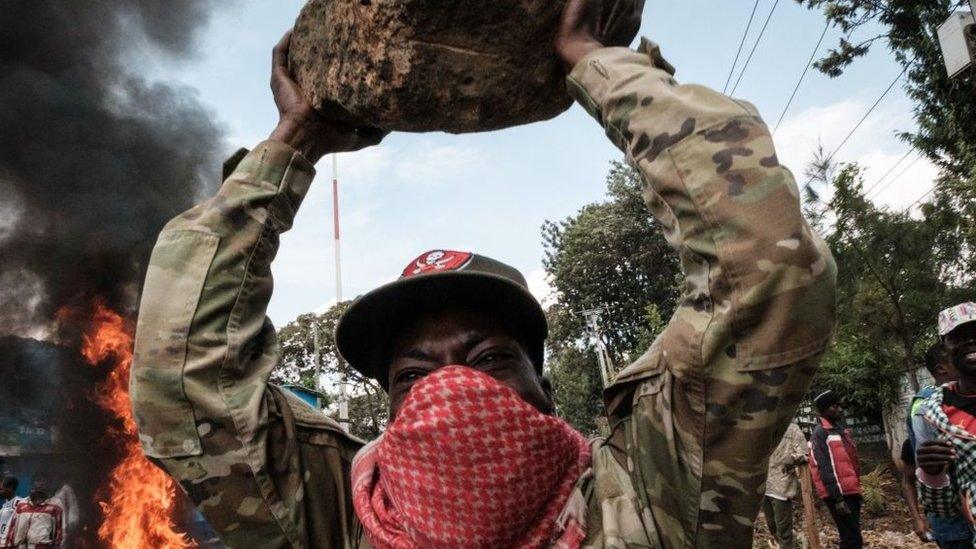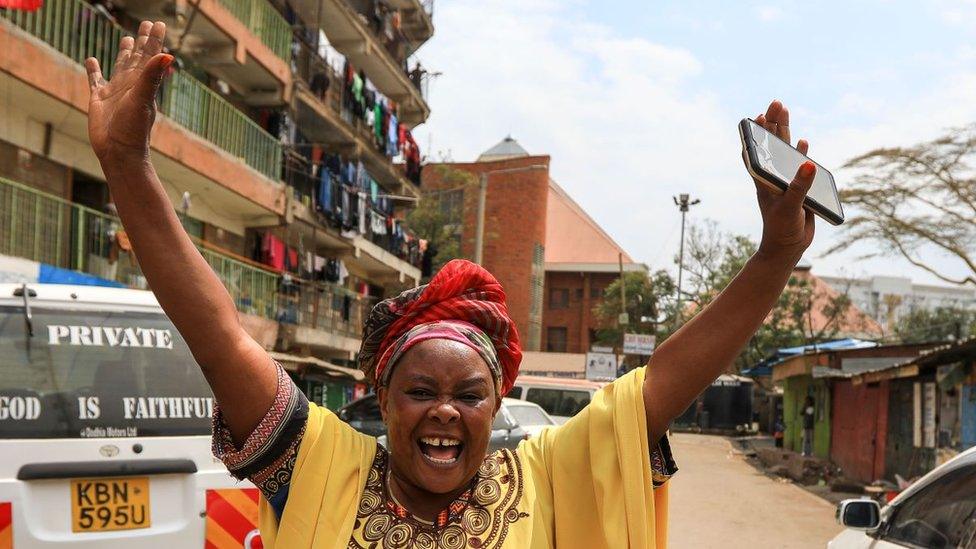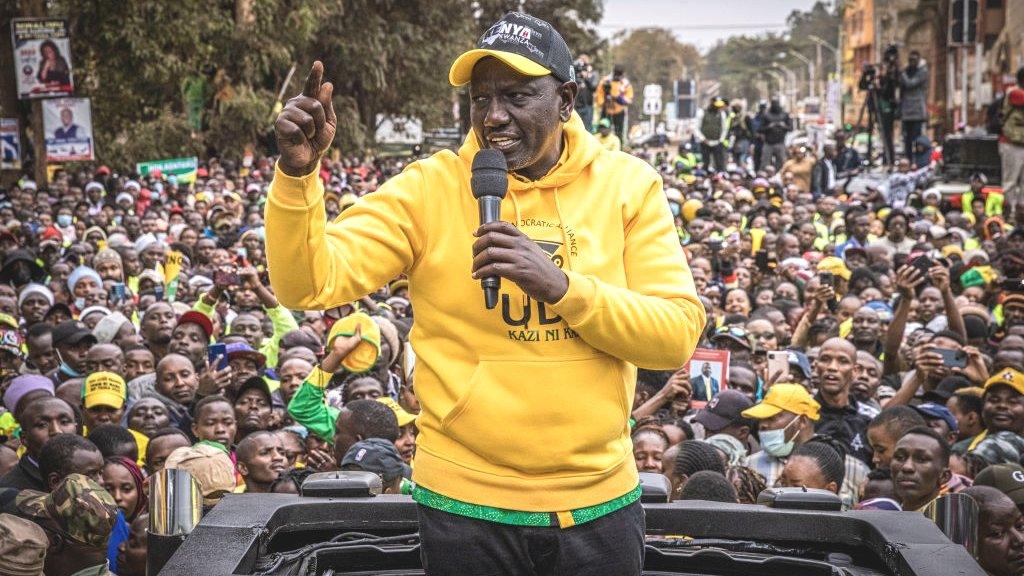Kenya protests: Raila Odinga's convoy tear-gassed in Nairobi
- Published

Opposition supporters are demanding the resignation of the president
Kenyan police have tear-gassed opposition leader Raila Odinga's convoy in the capital, Nairobi, as he spearheaded the biggest protest against President William Ruto's government since it took office.
The protests have also spread to other cities, with a university student reportedly shot dead in Kisumu.
Mr Odinga accuses the government of being "illegitimate", and of failing to tackle the high cost of living.
Mr Ruto has rejected the claims.
Kenya's highest court upheld his victory in last year's election, but Mr Odinga insists that the election was "stolen".
He has been driving through Nairobi's residential suburbs to rally his supporters and has vowed to organise weekly protests against the government.
It has caused many businesses to shut in the city, due to fears of looting. At least one person has been reportedly shot in the capital.
Running battles have taken place on the main Kenyatta Avenue between police and demonstrators, some of whom are throwing stones at the security officers.
Roads leading to key government buildings have been blocked and the president's official residence sealed off.
In the western city of Kisumu, where Mr Odinga draws a fanatical following, riot police confronted protesters.
The university student died after being shot in the neck by police in the Maseno area of the city, Kenyan media reports.
Police said demonstrators threw stones and injured six officers, prompting security forces to fire live bullets.

The opposition leader has strong support in Kibera, one of the poorest areas in Nairobi
Mr Odinga's convoy was tear-gassed by police as he left a hotel after addressing the media. Hundreds of his supporters were part of the procession.
An adviser to Mr Odinga later tweeted , externalthat the opposition leader's vehicle had been hit by a bullet.
"Our windscreen has been badly damaged," Prof Makau Mutua said. He did not give further details, and it is unclear exactly where the alleged incident took place.
Police had earlier denied the opposition permission to hold the protest, and warned that any gathering would be illegal.
Mr Ruto said the government would not condone "impunity".
"We have a responsible government in office who have a constitutional duty to protect life and property. We have a country to run," he said.
Some of the fiercest scenes have been in Nairobi's Kibera settlement - a poor neighbourhood with a strong history of supporting the opposition.
"We came here peacefully, but they tear-gassed us," 21-year-old Charles Oduor told the AFP news agency in another district of Nairobi.
"They lie to us everyday. Where is the cheap maize flour they promised? Where are the jobs for the youth they promised? All they do is hire their friends."
Footage shared by Kenya's Standard newspaper earlier on Monday appears to show local bus operators fleeing their transport hub in central Nairobi, external.
Meanwhile, the second-biggest opposition party in South Africa, the Economic Freedom Fighters (EFF), also held nationwide protests to demand the resignation of President Cyril Ramaphosa over the worsening economy, power cuts, and widespread corruption.
Several thousand people marched to his official residence in the capital, Pretoria.
"Our demands are simple, we want Ramaphosa to leave this house," EFF leader Julius Malema said.
The government said it had authorised the deployment of more than 3,000 troops to help police maintain law and order, and 85 people had been arrested.
Related topics
- Published5 September 2022

- Published2 September 2022
